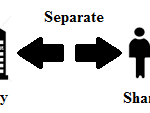All the companies must be registered under the Companies Act. A certificate of incorporation must be issued by the registrar of the company after registration. Different jurisdictions can form different companies. Some of the most common types of companies are as follows −
Private Company
● A company is said to be a private company if it does not allow its shareholders to transfer shares.
● If any transfer of shares is allowed, the company limits the number of its members to 50 and does not entertain any invitations to the public for subscribing any shares of the company.
● These types of companies offer limited liabilities to their shareholders but also place some restrictions on their ownership.
● A private company can have a minimum of 2 members and a maximum of 50 members, excluding the employees and the shareholders.
● A private company is desirable in those cases where it is intended to take the advantage of corporate life, has limited liability and the control of the business is in the hands of few persons.
● In private sector, an individual can gain control of the entire business firm.
Public Company
● At least seven members are needed to form a public company.
● The maximum number of members remains unrestricted in the case of public companies.
● A Prospectus is issued by the public companies to invite people to buy the shares of the company.
● The liability of the members is limited by the value of the shares they purchase.
● The shares of a public company are sold and bought freely without any obstruction in the stock market.
Companies Limited by Guarantee
● Every member of these companies promises to pay a fixed amount of money in the event of liquidation of the company.
● This amount is denoted as guarantee.
● There is no liability to pay anything more than the value of the share and the guarantee. Some of the substantial resultants of companies limited by guarantee are charities, community projects, clubs, societies, etc.
● Most of these companies are not into any profit-making.
● These types of companies can be considered as private companies offering limited liabilities to their members.
● A guarantee company substitutes share capitals with guarantors willing to pay a guarantee amount upon the liquidation of the company.
Companies Limited by Share
In the case of companies limited by shares, the shareholders pay a nominal value of money contributing to the share capital. The payments can be done either at a time or by installments.
● The members do not have to pay anything more than the fixed value of the share. Companies limited by shares are the most popular among the registered companies.
● These types of companies are required to have the suffix ‘Limited’ at the end of their names so that the people know that the liability of its members is limited.
Unlimited Company
● Unlimited companies are the companies where the liabilities of the shareholders are unlimited as in the case of partnership firms.
● Such companies are permitted under the Companies Act but are not known.
● These types of companies are incorporated either with or without a share capital.
● The shareholders are liable to donate whatever sums are required to pay the outstanding debts of the company, should it go into formal liquidation and if there is any need to meet the insufficiency of assets to pay the debts and liabilities and the fixed cost of liquidation.
● The members or shareholders have no direct liability to the creditors or security holders of an unlimited company.


